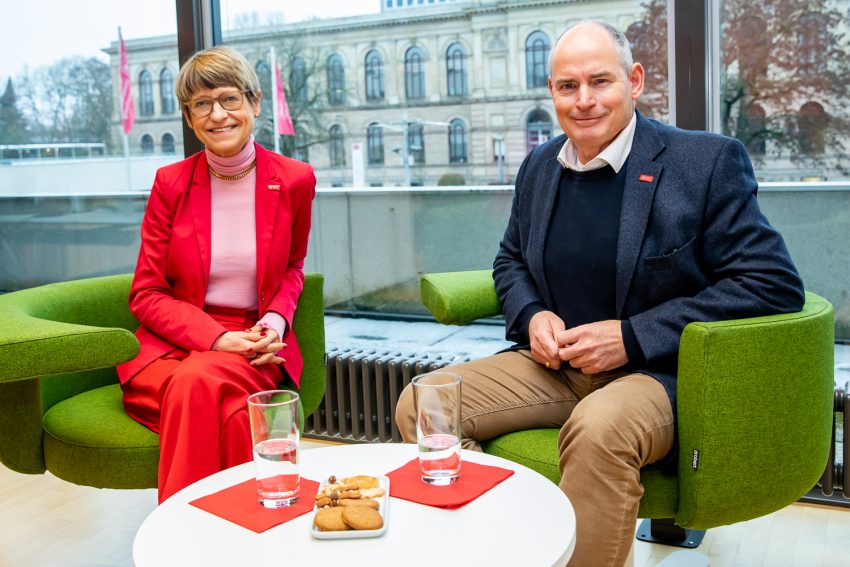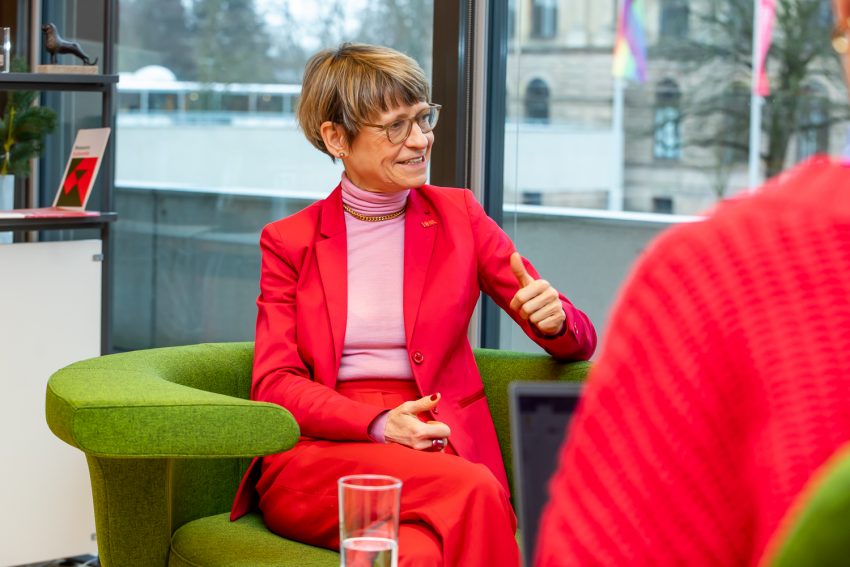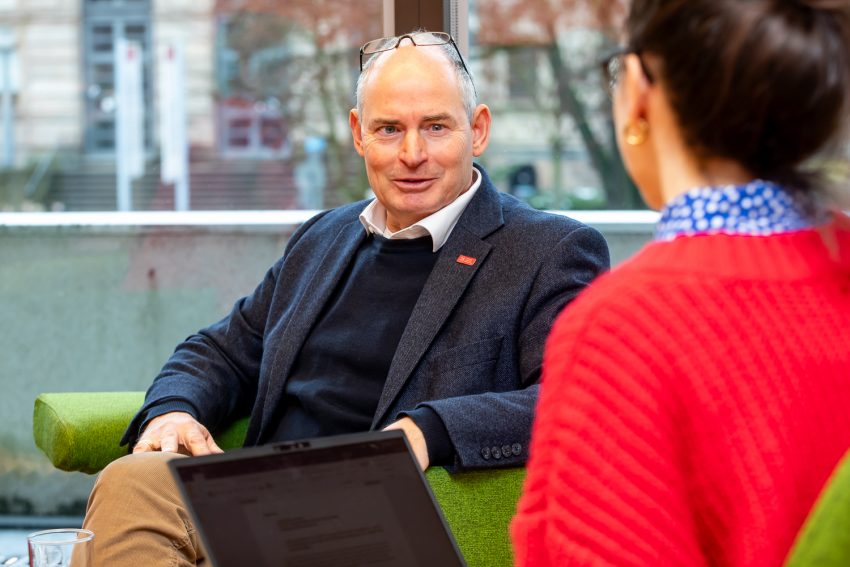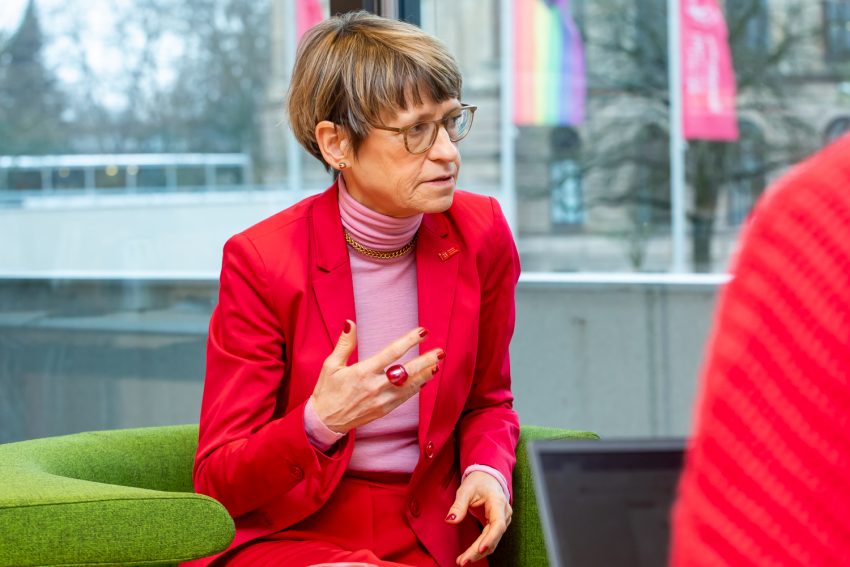Foundation university information week: What are the benefits of active participation? An interview with President Angela Ittel and Vice-President Dietmar Smyrek
From 15 to 19 January, the foundation university information week will take place at TU Braunschweig. We asked president Angela Ittel and vice-president Dietmar Smyrek in an interview what the information week is all about and how you, as a member of TU Braunschweig, can help shape the decision-making process for the foundation university.

President Angela Ittel and vice-president Dietmar Smyrek in an interview about the foundation university information week. Photo credit: Philipp Ziebart/TU Braunschweig
Dear Mrs Ittel, dear Mr Smyrek, a few weeks ago we learned that TU Braunschweig is on its way to becoming a foundation university. What does that mean for our university?
Angela Ittel: First of all, thank you very much for this very good question, because it allows us to clear up a misunderstanding that many of our employees have right at the beginning. We want to be as transparent as possible. It is true that Technische Universität Braunschweig is currently examining the possibilities and consequences of becoming a foundation university. This means that no decision has yet been taken. Only the senate can make this decision.
We are currently putting the model of a foundation university up for discussion by all members and invite everyone to a lively exchange.
When the senate makes the final decision, what is the role of the executive board in this process?

Präsidentin Angela Ittel im Interview zur Informationswoche Stiftungsuniversität. Bildnachweis: Philipp Ziebart/TU Braunschwieg
Angela Ittel: As the executive board, we are responsible for the strategic development of the university. The role of universities in society has been changing for years. Against this backdrop, our goal is to position our university in such a way that we will continue to be an attractive employer, provide the conditions for excellent research and teaching, and meet the needs of our students. We want to be positioned in such a way that we can afford to do all this and make independent decisions. We want to be an exciting place for science, education and transfer activities.
In addition, we are in enormous competition with other universities, colleges and research institutions as we all compete for the same, currently very scarce, resources to achieve our strategic goals. This is an area of tension in which we are seeking a solution.
Turning now to the role of the executive board in the process of becoming a foundation university, the sustainable funding opportunities provided by the state are very limited, and the current budgetary situation does not suggest that this situation is likely to change. We are therefore looking for ways to put TU Braunschweig in the best possible position for a successful future. As the executive board, we have now given the impetus to think about new financing options and, above all, organisational options and to examine them for their future viability.
After a thorough review, our assessment of the foundation model is entirely positive. We now see our role as sharing information with all members of the university so that they can make up their own minds and the senate can make a decision that is in the best interests of its members.
How is the senate’s decision made in this process?
Angela Ittel: The senate will decide in the interest of the members whether we should continue along this path. Only then will we enter into negotiations with the MWK on the organisation of the foundation university. This will include all the details of all the important framework conditions. In the negotiations with the ministry, we want to achieve the best possible result for TU Braunschweig. Best possible means: We want to create the best possible conditions for a university with room for manoeuvre in all performance dimensions: research, studies and teaching, transfer and governance & administration. These must first and foremost meet the needs of all members of our university. The outcome of these negotiations will then go back to the Senate for a vote.
Dietmar Smyrek: In answer to your first question, whether everything has already been decided, I would like to emphasise that in the many years I have been in office, the executive board has always sought the important discourse with the committees, the status groups and the staff council. We always emphasise that we are all the university and that it is the joint result that counts. (This does not mean that it always has to be unanimous). The presidential board cannot and will not take decisions on such central and fundamental processes alone. Here we share responsibility with the senate and other university bodies. For this reason, the executive board has not yet made a decision, nor will we embark on the road to becoming a foundation university before the senate’s decision is final.
The idea of a foundation university raises some concerns. How can we address these and ensure that all concerns are taken seriously and that the potential benefits and, above all, the disadvantages are discussed openly and honestly?

Vice-president Dietmar Smyrek in an interview on the foundation university information week. Photo credit: Philipp Ziebart/TU Braunschweig
Dietmar Smyrek: When we say that we see it as our task to create an open and constructive framework in which all concerns can be expressed and answered, that’s exactly what we mean. That is why we are organising an foundation university information week in January 2024. We would like to encourage and invite all staff and students of our university to take part in the events and discussions.
I would also like to emphasise once again and address directly all members of our university: We rely on all of you for feedback and open exchange. Please take the opportunity to talk to each other and to us. After the information week, you will still have around eight weeks to contact your representatives in the senate and help shape the senate’s decision.
Angela Ittel: We are also aware that some of your questions and concerns, which are often very specific to your personal situation, do not want to be made public. As we have only received a limited number of questions and opinions on the email address set up specifically for questions about the foundation, we have now created an anonymous alternative. You will find a linked question portal on the foundation university information page. Here you can ask questions without giving any personal details. We will also use this tool for the panel discussion during the information week, so that everyone in the audience can submit their questions.
It is my and our explicit request: ask your questions, tell us your concerns and do not hold back your criticism. We can only make good progress if we engage in a critical discourse and name and acknowledge the problems and risks we perceive. We need your support to include these points in the negotiations with the MWK or to clarify them internally in cooperation with the staff council.
In your opinion, what are the positive and negative aspects of becoming a foundation? Can you briefly describe them?
Dietmar Smyrek: As Mrs Ittel has already mentioned, we are in fierce competition with other universities and research institutions. The financial support from the state is currently not sufficient to optimise our position as a place of work and ideas. We need more room for manoeuvre if we are to remain competitive in the future. One example: as a foundation university, we would be allowed to keep the interest income and have more room for manoeuvre. The same applies to unnecessary bureaucratic processes, which we can avoid thanks to the foundation model. TU Braunschweig wants to take its future more into its own hands. Examples from other universities show that this is possible. In Niedersachsen alone, there are already five successful foundation universities.

President Angela Ittel in an interview on the foundation university information week. Photo credit: Philipp Ziebart/TU Braunschweig
Angela Ittel: We hear a lot of opinions and discussions about possible disadvantages for employees, for example about changes to the right of termination. I can well understand that this is causing concern. I would like to allay these fears. Several trade unions have reached an agreement with the state that effectively excludes such disadvantages for all existing employees at the foundation universities. It is equally important to us that this also applies to future employees. I am confident that we will reach a reliable and binding agreement with the staff council.
Is there anything else you would like to say to the staff and members of our university?
Angela Ittel: Get informed and ask questions. Be curious and make up your own mind. Also actively approach your senators. In this way you can play an active and personal role in shaping the decision.
Dietmar Smyrek: I would like to add that this is an open and certainly very exciting discussion and we are very much looking forward to all your contributions.
Thank you very much, Mrs Ittel. Thank you very much, Mr Smyrek! See you at the information week in January.
The interview was conducted by Asmik Kostandian.
Read more about the information week and ask your questions using the anonymous question tool here.
